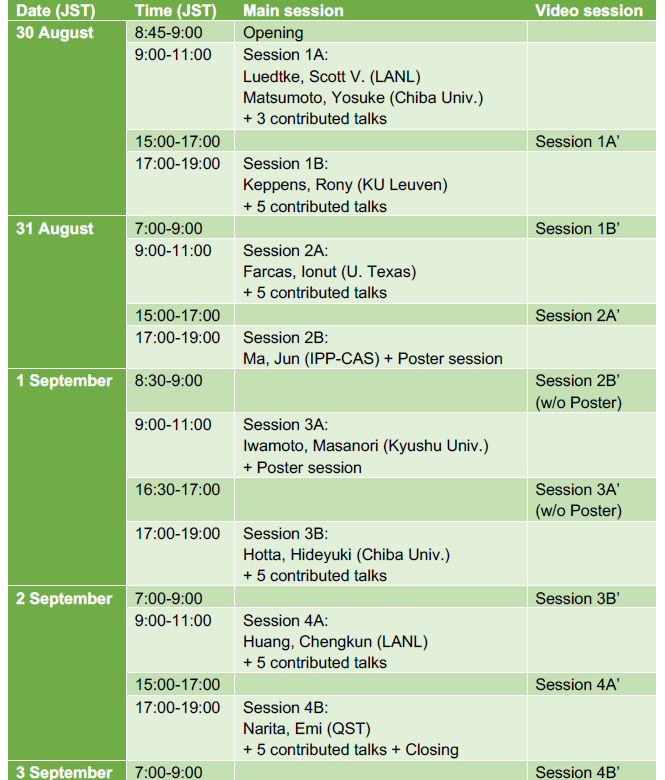HOME
>
Program
|
Program
|
|---|
ICNSP2022 Conference Program (PDF)
Last updated: Sep. 1, 2022, 4:16pm JST
Poster Presentation List
Book of Abstracts
See also information.
-
Timetable
-

-
➣ Session A:9:00-11:00 JST (2:00-4:00 CEST, 20:00-22:00 EDT, 17:00-19:00 PDT).
-
➣ Session B:17:00-19:00 JST (10:00-12:00 CEST,4:00-6:00 EDT, 1:00-3:00 PDT).
-
➣ Session A' and B' : Video recorded sessions for audience in different time zones.
-
➣ Invited presentation 30min (25min talk with 5min discussion).
-
➣ Contributed presentation 15min (12min talk with 3 min discussion).
-
➣ Poster session 90min.
-
➣ All posters can be presented in Session 2B and 3A (both or either)
-
(CEST = JST-7, EDT = JST-13 , PDT = JST-16)
| Invited speakers |
|---|
- Farcas, Ionut (The University of Texas at Austin)
- "Enabling Uncertainty Quantification In Predictive Plasma Turbulence Simulations"
- Hotta, Hideyuki (Chiba University)
- "Solar differential rotation reproduced with high-resolution magnetohydrodynamic simulations"
- Huang, Chengkun (Los Alamos National Laboratory)
- "Modeling of Coherent Synchrotron Radiation Effects in High Brightness Beams via a Novel Particle-mesh Method and Surrogate Models with Symplectic Neural Networks"
- Iwamoto, Masanori (Kyushu University)
- "3D PIC simulation of coherent emission from relativistic shocks"
- Keppens, Rony (KU Leuven)
- "When Hot Meets Cold: Recent Progress In Solar Flare Modeling"
- Luedtke, Scott V. (Los Alamos National Laboratory)
- "VPIC 2.0: Performance-Portable Particle-in-Cell for Present and Future Supercomputers"
- Ma, Jun (Institute of Plasma Physics, Chinese Academy of Sciences)
- "Development of a full MHD eigenvalue code with the use of symbolic computation technique"
- Matsumoto, Yosuke (Chiba University)
- "Particle-in-cell simulations for elucidating cosmic-ray accelerations in the exascale computing era"
- Narita, Emi (National Institutes for Quantum Science and Technology)
- "Machine-Learning Assistance With Nonlinear Gyrokinetic Simulations By Recognizing Wavenumber-Space Images"
